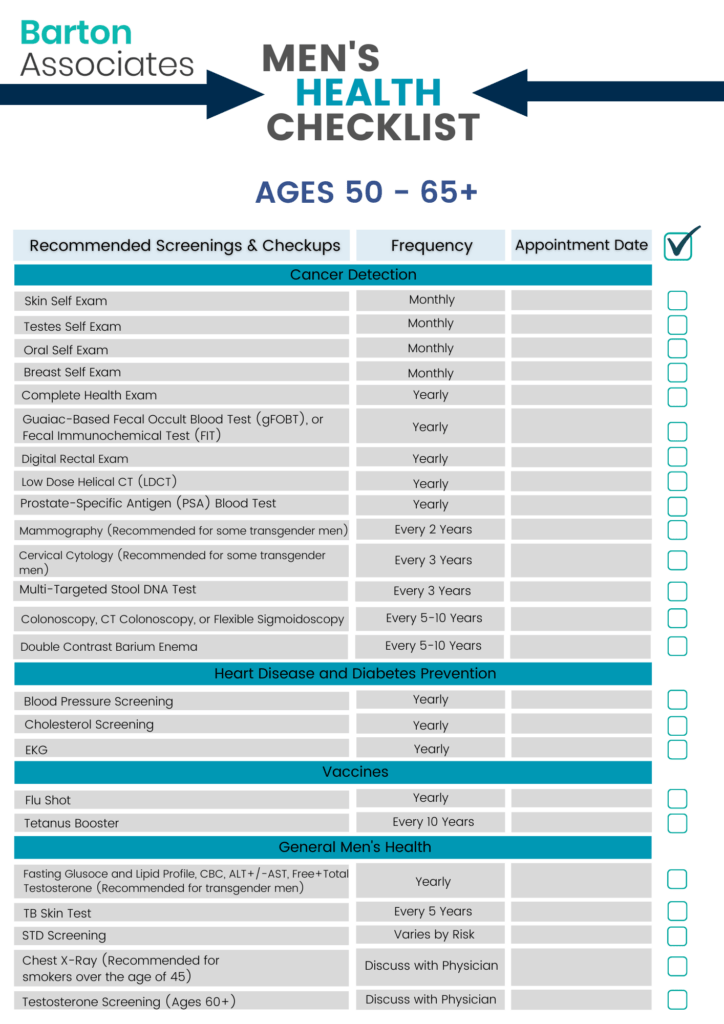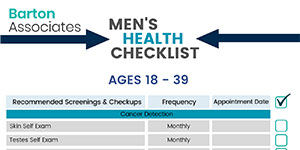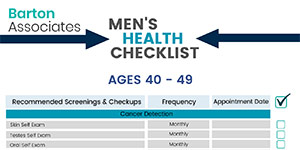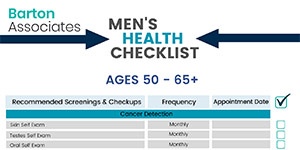Complete Men's Health Checklist for Men Aged 50-65+

EMPHASIZING THE IMPORTANCE OF MEN'S HEALTHCARE WITH AGE
Keeping up with your health exams, screenings, and appointments may not have been a challenge in your 20’s, but as men age and the risk for certain diseases increases, the list of doctors visits gets longer, and increases in frequency. As they say, getting older isn’t easy!
While scheduling and attending your healthcare appointments may become a more tedious task as you age, don’t get too overwhelmed trying to keep track. Our Men’s Health Checklist for men aged between 50 to 65+ is a guideline to make sure you’re up to date on all of your screenings and exams, and your physician should guide you through which procedures and tests they recommend for you.
Click to Download Your Men’s Health Checklist for Ages 50-65+ Now!

While you’re equipped to simply sit down and get to calling your doctor to schedule your checkups and tests, it’s definitely helpful to know what exactly you’ve just scheduled, and why it’s important you get it done! Read on for some further information about the recommended screenings, checkups, and vaccines you can find in our Men’s Health Checklist for Men Aged 50-65+.
- Complete Health Exam
An assessment of overall health utilizing tests which are often ordered during your annual wellness visit in order to evaluate health concerns common among men. - Digital Rectal Exam (DRE)
A test conducted by a physician that checks the back wall of the prostate gland for tenderness, enlargements, lumps or hard spots using a gloved and lubricated finger. - Guaiac-Based Fecal Occult Blood Test (gFOBT)
A fecal test that checks for hidden blood in the stool by placing stool on cards coated with a chemical substance (guaiac), and sending the sample to a laboratory for testing. - Fecal Immunochemical Test (FIT)
A fecal test that checks for hidden blood in the stool by placing a small sample of stool into a collection tube for testing. - Low Dose Helical CT (LDCT)
A low-dose CT scan of the lungs to detect early stages of lung cancer by taking detailed x-ray images of the lungs inside of a CT machine. - Complete Health Exam
An assessment of overall health utilizing tests which are often ordered during your annual wellness visit in order to evaluate health concerns common among men. - Mammography (Recommended for some transgender men)
A specialized medical imaging using a low-dose x-ray system to examine inside of the breasts to detect breast cancer and diseases. - Cervical Cytology (Recommended for some transgender men)
Also called a Pap test or Pap smear, a cervical cytology is the study of cells taken from the cervix using a microscope to detect changes in the cells of the cervix that could lead to cancer. - Prostate-Specific Antigen (PSA) Blood Test
A blood test that measures the level of prostate-specific antigen (PSA) – a protein produced by normal and cancerous cells of the prostate gland – in the blood. - Multi-Target Stool DNA Test
A fecal test which detects mutations associated with colorectal cancer after a stool sample is collected and sent to a laboratory to test for abnormalities. - Colonoscopy
An exam used to detect changes or abnormalities in the colon (large intestine) and rectum by inserting a colonoscope (a long flexible tube with a small camera at the tip) into the rectum which allows the doctor to to view inside of the entire colon. - CT Colonoscopy
A virtual colposcopy which uses a CT scan to produce hundreds of cross-sectional images of your abdominal organs to detect changes or abnormalities. - Flexible Sigmoidoscopy
An endoscopic procedure where your doctor examines the rectum and lower colon by using a sigmoidoscope (a thin, flexible, lighted tube with a camera at the tip) to visualize the area. - Double Contrast Barium Enema
A procedure where a liquid containing barium is inserted into the rectum which outlines the colon and rectum to easily detect abnormalities in an x-ray image. - Blood Pressure Screening
A measurement of the pressure in your arteries as your heart pumps which is done by placing a stethoscope over the major artery in your upper arm to listen to blood flow while an arm cuff is inflated with air. - Cholesterol Screening
A blood test which measures your levels of low-density lipoprotein (LDL), or “bad” cholesterol, high density lipoprotein (HDL), or good cholesterol, triglycerides, a type of fat which your body uses for energy, and total cholesterol, the total amount of cholesterol in your blood. - EKG
A test used to detect heart problems and monitor heart health using small, plastic patches that stick to the skin called electrodes placed on specific spots on the chest, arms, and legs. An ECG (electrocardiogram) machine connected to the electrodes measures and interprets electrical activity in the heart. - Flu Shot
An annual vaccination that prevents the influenza virus. - Tetanus Booster
A vaccination that prevents against tetanus, an infection caused by Clostridium tetani bacteria. - Fasting glucose and lipid profile CBC, ALT/-AST, Free+Total Testosterone (Recommended for transgender men)
- Fasting glucose and lipid profile: A blood test including measurements for cholesterol and a measurement of your fasting blood sugar level.
- ALT/-AST: A Blood test which measures different types of liver enzymes to detect liver damage.
- Free+Total Testosterone: A blood test that measures the levels of free testosterone (testosterone that is not attached to a protein) and total testosterone (includes both free testosterone and testosterone attached to a protein) in your blood used to diagnose various conditions.
- TB Skin Test
A test performed in two visits where a small amount of fluid called tuberculin is injected into the skin on your lower arm on the first visit, and after 48 to 72 hours a healthcare professional examines for a reaction in the second visit. - STD Screening
A blood test used to find out if you have been infected with a sexually transmitted disease. - Chest X-Ray
A test that uses radiation to take a picture of your chest using an x-ray machine that sends a beam of radiation through the chest and records an image. - Testosterone Screening
A blood test that measures your levels of testosterone used to diagnose a variety of conditions including decreased sex drive. - Bone Mineral Density Test
A test in which x-rays are used to measure how much minerals and calcium are in your bones to detect osteoporosis.
To learn about self exams, check out the 4 Monthly Self Health Exams that men should be doing on our blog.


